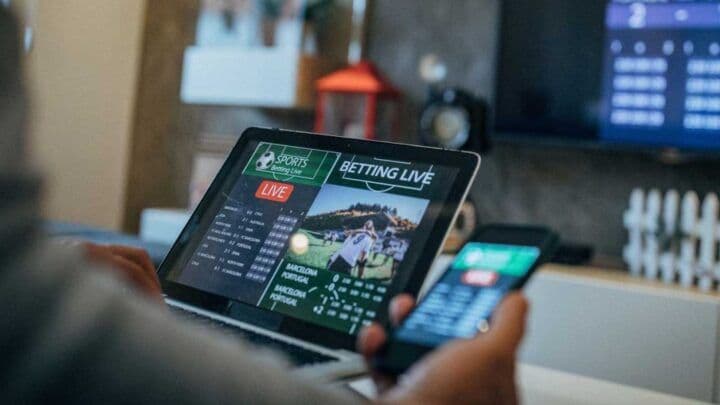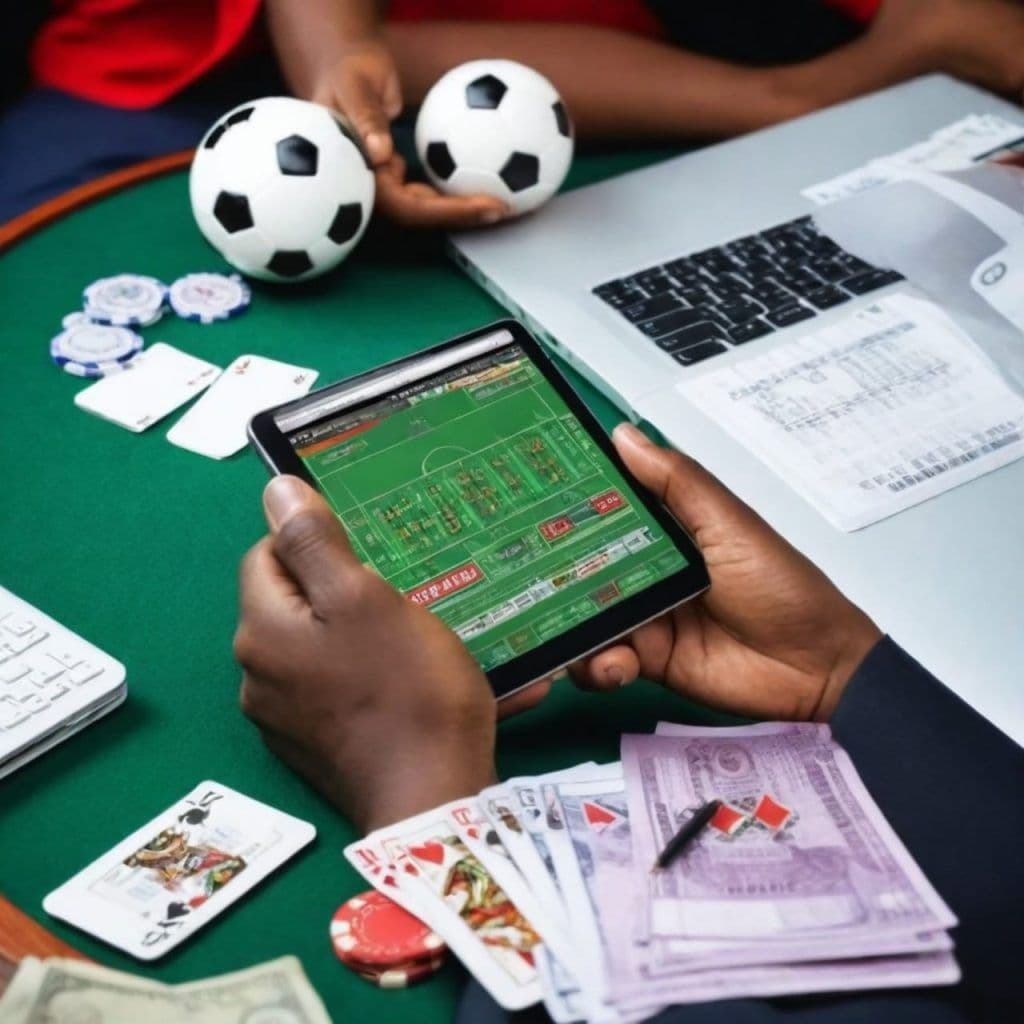Betting
The Game-Changer: Sports Betting as a Catalyst for Nigerian Sports Development
Ken Egbas discusses the potential of sports betting to boost Nigeria's sports industry, emphasizing transparency, effective regulation, and innovative approaches. He highlights the launch of the Nigeria Sports Data Aggregator System (NiSDAS) as a step towards leveraging technology for better sports management.
SportsBoom offers honest and impartial bookmaker reviews to help you make informed choices. While we may earn commissions through affiliate links, our content remains independent and free from promotional influence. For more information, see our Content Transparency and How We Review pages.

Image Credits: ThisDayLive
Ken Egbas: “I hope to witness a time when gaming companies make benchmarks not just on profitability, but on what they contribute to the growth of the sports industry.”
The State of Sports Betting in Nigeria
The Nigerian sports industry has immense potential but faces significant challenges, such as inadequate funding, poor infrastructure, and a lack of commercial viability. On the other end of the spectrum, the sports betting industry is growing rapidly in Nigeria and with an estimated market value of over $2 billion and millions of active users, the industry can provide a solution by generating revenue streams that can be reinvested into the development of sports in the country.
In this exclusive interview with SportsBoom.com, the Special Adviser and Consultant to the Honourable Minister for Sports Development, Ken Egbas shares his thoughts, and he makes it crystal clear that a collaboration could be the real game changer for both industries.
In the case of the gaming industry, we have several companies that are not owned by Nigerians and they’re operating from offshore and setting up online infrastructure.
Ken Egbas
How Sports Betting Supports Grassroots Development
Q: What specific measures can be implemented to ensure that revenue from sports betting is transparently and effectively channelled into grassroots sports development?
“It’s a fact that the gaming companies pay different levels of taxes to various bodies, but the issue is that in an industry where the top 10 gaming companies declare profits over 100 to 250 million dollars annually, it presents a huge market for sports development. In the case of the gaming industry, we have several companies that are not owned by Nigerians and they’re operating from offshore and setting up online infrastructure. I think this is one of the problems which the government needs to address head on,” Egbas told betting news site SportsBoom.com.
The whole rationale behind why this should be the case is that if there is an ecosystem, one element feeds the other and everything needs to work perfectly, especially when it comes to our infrastructure. I think there is room for engagement at the top level with the federal government and the Federal Inland Revenue Service (FIRS) to see how some percentage of the revenue that is derived from that ecosystem can go to the sports industry to help us with infrastructure, The opportunity is there, and I think it’s something that the federal government needs to take very seriously.
Now, the only source of funding for the sports industry is the federal government and occasional sponsorships, but it doesn't meet 0.01% of the needs of Nigerians in the sports industry.

Image Credits: The Guardian Nigeria
Addressing Match-Fixing Concerns
Q: How can the ministry address concerns about match-fixing and maintaining the integrity of Nigerian sports while embracing sports betting as a funding source?
Egbas: All over the world, integrity as regards the fallacy of results from the sports industry is a concern. For example, this year at the premier league, I think about 3 players were banned based on the foreknowledge of an act which they were supposed to commit and executed the various acts accordingly. Scenarios like this will always play out, but the primary way to ensure the integrity of sports is to build systems that work.
For instance, the reason why those players I mentioned earlier could be identified was that a panel of inquiry was set up and attended the hearing of the individuals who were adjudicated over the matter. They gave their judgments and their deliveries without any prejudice or favour and that’s because they have systems that work. If such a scenario played out in Nigeria, the police would probably have to get involved and then proceed to the court where justice might not be served, etc. So, it’s not a problem for the minister or the ministry alone, it’s a problem for the entire system including the athletes, the legal system, the security system, the investigative system and even the media. The media is important, because some investigations commence, due to investigative journalism.

Image Credits: The Cable
The other part of this is that for a betting company to be able to access a key player on a team and get into some kind of agreement with them to commit a particular act to shape betting outcomes, betting companies also must take responsibility. Looking at the growing industry in Nigeria, are there codes of ethics by which the industry is governed? There are numerous stories of match-fixing and what needs to be done to curb such occurrences is to come up with a regulatory framework which should encompass the ministry, the various federations, and other stakeholders to ensure that it works.
I think that the government has to first create an organ that looks at these companies and establish if there are Nigerians involved in the ownership of some of these companies. That’s where regulation or the enforcement of regulation starts from.
Ken Egbas
Sports Betting as a Catalyst
Q: What benchmarks or key performance indicators would you propose to measure the success of sports betting as a catalyst for sports development in Nigeria?
“The only key performance indicator in that industry is profitability. If you observe the gaming companies and compare them to other businesses, you’ll find that there is minimal investment and maximum return. When you also take into consideration that most of these gaming platforms are online, you’ll see that most of the time, they use software and have offshore offices as opposed to physical offices in Nigeria. Hence, the only benchmark is profitability. However, I think that if the betting industry understood the advantages that could come from expanding their businesses more, it would go a long way for them,” Egbas told betting news site SportsBoom.com.
Recently, we had a conversation with a gaming company called Yanga Games/Technologies Ltd. The Minister of Sports had a conversation with the chairman of the company, Derrick Kantebe and surprisingly, it went a lot better than we anticipated.
One month after the initial meeting, Derrick had another meeting with the Sports Minister saying: "We make money from sports, no doubt about it and I pay my taxes, so I think we can create a platform where Nigerians can bet on sports in Nigeria and a certain percentage (40%) of the proceeds of that bet that will go to sports development in Nigeria.’

Image Credits: Score Nigeria
They brought that forward as their Corporate Social Responsibility (CSR) in contributing to sports development in Nigeria. I recall that when that agreement was signed at a press conference, it ruffled a lot of feathers in the sports betting industry and that happened because most of the companies knew that this was the right thing to do, but because no one held them accountable, everyone has gotten away with it. Since that agreement was signed with Yanga, we’ve had about 4 companies reach out to the sports ministry, asking how they can collaborate with us to support us. We never would have had that situation if one company didn’t make the first move in deciding the right thing. So, when you look at what the future of the industry is in terms of what the benchmarks are, I think the gaming companies should focus less on profit and think in a direction that’s similar to Yanga Games were thought also goes into investment in the sports talent.
Another challenge which I didn't mention earlier is that most Nigerians place bets on foreign sports. Could we come to a point where we get 60% of the 115 million Nigerians who go on those platforms to also get involved in sports at home? It will certainly create a market for local sports. Why can’t we have people betting on athletics? This is the innovation I think we need to bring in terms of what works best in the future for the industry.
In terms of benchmarking, hopefully as we go forward with the example that has been set by Yanga Technologies Ltd, we will also witness companies making benchmarks not just on profitability, but on what they contribute to the growth of the sports industry or the sporting ecosystem in Nigeria, without which they wouldn’t have a business to begin with.
Sports Betting as a Catalyst
Q: What benchmarks or key performance indicators would you propose to measure the success of sports betting as a catalyst for sports development in Nigeria?
“The only key performance indicator in that industry is profitability. If you observe the gaming companies and compare them to other businesses, you’ll find that there is minimal investment and maximum return. When you also take into consideration that most of these gaming platforms are online, you’ll see that most of the time, they use software and have offshore offices as opposed to physical offices in Nigeria. Hence, the only benchmark is profitability. However, I think that if the betting industry understood the advantages that could come from expanding their businesses more, it would go a long way for them,” Egbas told betting news site SportsBoom.com.
Recently, we had a conversation with a gaming company called Yanga Games/Technologies Ltd. The Minister of Sports had a conversation with the chairman of the company, Derrick Kantebe and surprisingly, it went a lot better than we anticipated.
One month after the initial meeting, Derrick had another meeting with the Sports Minister saying: "We make money from sports, no doubt about it and I pay my taxes, so I think we can create a platform where Nigerians can bet on sports in Nigeria and a certain percentage (40%) of the proceeds of that bet that will go to sports development in Nigeria.’

Image Credits: Score Nigeria
They brought that forward as their Corporate Social Responsibility (CSR) in contributing to sports development in Nigeria. I recall that when that agreement was signed at a press conference, it ruffled a lot of feathers in the sports betting industry and that happened because most of the companies knew that this was the right thing to do, but because no one held them accountable, everyone has gotten away with it. Since that agreement was signed with Yanga, we’ve had about 4 companies reach out to the sports ministry, asking how they can collaborate with us to support us. We never would have had that situation if one company didn’t make the first move in deciding the right thing. So, when you look at what the future of the industry is in terms of what the benchmarks are, I think the gaming companies should focus less on profit and think in a direction that’s similar to Yanga Games were thought also goes into investment in the sports talent.
Another challenge which I didn't mention earlier is that most Nigerians place bets on foreign sports. Could we come to a point where we get 60% of the 115 million Nigerians who go on those platforms to also get involved in sports at home? It will certainly create a market for local sports. Why can’t we have people betting on athletics? This is the innovation I think we need to bring in terms of what works best in the future for the industry.
In terms of benchmarking, hopefully as we go forward with the example that has been set by Yanga Technologies Ltd, we will also witness companies making benchmarks not just on profitability, but on what they contribute to the growth of the sports industry or the sporting ecosystem in Nigeria, without which they wouldn’t have a business to begin with.
Potential Conflicts of Interest
Q: You stated that about 4 companies approached the sports ministry for collaboration after Yanga games set the pace. How do you plan to mitigate potential conflicts of interest that might arise, since you also stated that some feathers were ruffled during the signing of the agreement?
Egbas: I don't see any way in which a conflict of interest would arise. Sports in Nigeria is made up of 53 federations; it’s our responsibility to ensure that there won't be a conflict of interest, and we’ll do just that.
Yanga came up with this offer of their own volition and I saw something smart on their part that might have elicited the reactions that followed. Yanga is positioning itself for the future to demonstrate their care for sports development by partnering with the sports ministry. With gestures like this, I foresee this as an advantage when it comes to regulations and tax for Yanga Games.
FIRS tax laws indicate that any company which is investing a percentage of its annual income in certain areas like development, sports, etc. is supposed to get a tax relief. With what Yanga has done, they have led from the front.
Ken Egbas
They may not be the biggest players in the market now, but they’ve situated their business in a very safe place where they are demonstrating to Nigerians that every time they participate on their platform, a percentage will go to a jersey of a Nigerian, or pay for a competition, etc. I see that as smart.
So, when you see other companies reacting to that, it was an innovative move and if they want to come forward now, I think there is room for us to look at different areas in which people can take up different aspects. Therefore, I don't foresee a conflict-of-interest scenario. The most important thing is that the reorientation needs to happen in the sports betting industry. It's not going to go on forever. The industry can’t declare a market value of $1.5 billion in a year and not expect that people start to take a closer look at it.
So, I think it’s in the interest of these gaming companies to ask themselves questions about how they can plug in and make moves that give them a lasting advantage before such companies eventually get slammed with sanctions. Such actions demonstrate to the government and regulators that they are willing to partner with them to ensure that they add to sports development and contribute meaningfully to the ecosystem.
Leveraging Technology
Q: In what ways can the sports ministry leverage technology and data analytics to maximise the benefits of sports betting while minimising its risks to the sporting ecosystem?
Egbas: One of the biggest problems with why the sports ministry has never really taken off in Nigeria is there is an absence of an industry. Industry means that people in numbers have to be actively engaged. Those numbers must be known, their activities must be quantifiable. Their output must be qualitative and whatever that output is, it has to have market value. People also have to be willing to pay for it on an international or local scale. It also has to be competitive- that’s what makes us an industry.
When you talk about industry, especially looking through the lens of other developed countries, that term is used because those countries are putting in the work to ensure that their systems work. For an extended period in Nigeria, everything has been organic, not planned, and of course, when a process like this is organic, it comes with a lot of chaos. Everyone does their own thing and works in silos.
When John Enoh was appointed as the Minister of Sports, he sat with his team and made it clear what his aspirations were and asked a number of questions. He said:
‘I want to create legacies, I know we’ve had so many sports ministers, but I want to understand why the infrastructure decays so badly. Why would we build a stadium for 13 billion naira and we can’t get a full attendance? Why would a national stadium for example go into such abject decay that it would be sold for scrap at the real estate market? How come athletes perceive that they have more love for their country than it has for them?’

Image Credits: Convert Betting Codes
These are the kinds of questions that were asked and guess what? We don’t have the data to answer those questions. We can’t see the state of facilities like the stadia in real-time. Another example is the Ministry of Sports Development has 6 or 7 zonal offices across the country. Most times that we have meetings, the ministry must provide flight tickets and transportation for people to come to Abuja or some other location. Those meetings can’t be held via all the technology we have available today. We have another situation where right now the national broadcaster, the Super Eagles are playing a game in a stadium in Abuja and their parents can’t watch them and must resort to using services provided by DSTV, to watch a game that’s happening in their backyard.
So, recently the minister decided that the best way to solve this problem is using technology and it will bring Nigeria up to date to a level with some of these nations where these things work well eg. the Norwegian model.
Right now, the Ministry of Sports Development is in the process of calling for pitches and we are at the stage where we have selected 2 companies to work with to create a system, an application, and a platform known as Nigeria Sports Data Aggregator System (NiSDAS). On that system, we have 4 pillars. On the first pillar, we want to know who the athletes are from school age to education level.
As an individual registers, the system gives them an identification number. So, if they’re registering for a competition at the age of 7, they'll have to provide their real age, and we will keep that data throughout the time we manage the individual in question. Now, data is a major challenge, so this will really help.
The second part of that application is to help us with the management and monitoring of sports facilities in real-time. One of the deficits we have in sports in Nigeria is access to facilities. Some facilities lay dormant in various locations and are maintained at a very high cost. Yet, our athletes who are preparing for the Olympic games don’t have a place to train. So, we need to know where these facilities are.
Things are really looking up in this welfare aspect and one of the insurance companies that we’re in talks with, has informed us that if we use their services, they can increase the money that’s set aside for athletes’ insurance by up to 20 billion naira in 7 to 10 years
Ken Egbas
The third pillar is aimed at helping us to monitor Nigerian athletes in real time anywhere they are competing in the world and also to get scores and results or any sporting activities that involve Nigerians via smartphones and streaming services.
The 4th pillar entails the creation of an intra-communication platform for the ministry of sports development. It might interest you to know that from the data that we have, it shows that there are about 650,000 to 700,000 active Nigerian athletes. Of this number, 25% of these athletes succeed in representing the national teams at international competitions.
Imagine the president of Nigeria deciding to participate in a campaign aimed at resolving the welfare needs of athletes and choosing to contribute the sum of 10,000 naira to an athlete on a monthly basis- it would literally create a significant business opportunity for insurance companies. I chose this premise to disclose that the Ministry of Sports is working on setting up a welfare board via the use of NiSDAS.
When the app is finally up and running, it will provide a platform where athletes can disclose whatever welfare challenges, they may be experiencing to the welfare board.
So, you have that money there for the athletes and for that 20-25% that represent Nigeria, by the time they retire, they can turn that into a pension. We are working to use technology to solve these challenges. With the way, the minister has approached this challenge, insurance companies are falling over themselves to take up this opportunity and, in the end, we’ll have fewer situations where athletes get injured and feel abandoned by the country. So, when you ask about how we’re leveraging technology, NiSDAS which will be launched in a matter of weeks is one of those solutions. We are also considering other innovations that will help with welfare, infrastructure development, and setting up sports as a business.
Conclusion
In conclusion, the collaboration between the sports betting industry and sports development in Nigeria presents a significant opportunity for growth and progress. Egbas emphasises the need for transparent revenue channelling, effective regulation, and innovative approaches to maximise benefits while minimising risks.
The introduction of the Nigeria Sports Data Aggregator System (NiSDAS) showcases the ministry's commitment to leveraging technology for better athlete management, facility monitoring, and welfare programs. As the sports betting industry continues to evolve, there's a clear call for companies to prioritise not just profitability, but also their contributions to the overall sports ecosystem.
With initiatives like Yanga Games' partnership and the potential for more companies to follow suit, the future of Nigerian sports development looks promising. However, success will depend on continued collaboration, technological innovation, and a shared commitment to nurturing talent and building a robust sports industry in Nigeria.

Cynthia Areh is a power-packed international broadcast journalist with over 14 years of trailblazing experience in reporting, anchoring, and producing high-octane primetime daily newscasts.
Related Content
- Best AI Sports Betting Prediction Software
- What are Teasers in Sports Betting?
- Managing Emotional Bias
- What Are The Best Sports To Bet On?
- Parimutuel Betting Guide
- What Does SP in Betting Mean?
- What is a Prop Bet in Sports Betting?
- Superfecta Betting Explained
- What is an If Bet in Sports Betting?
- AI in Sports Predictions
- Futures Wagers Strategy
- Dead Heat Rules Betting
- Roulette Beginner's Guide
- Future of Betting Trends
- Line Movement & Sharp Action
- Fixed Odds Betting Explained
- What is a lucky 15 bet
- What Does Doubles Mean in Betting?
- What Does Overround Mean in Betting?
- What Does PK Mean in Betting?
- Wire-to-Wire Bets
- Social Media for Sports Insights and Wagering
- What Does 'The Chalk' Mean in Sports Betting?
- What is a ladder in sports betting?
- What is Head to Head Bets?